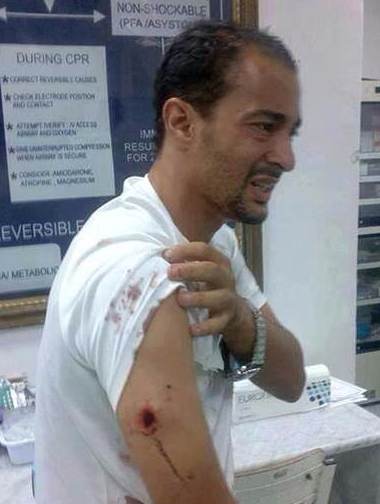![A sheep for . . .[restrict]the Eid sacrifice](http://www.libyaherald.com/wp-content/uploads/2013/10/Sheep-sacrifice.jpg)
Tripoli 14 October 2013:
It’s that time of year again! It may seem like we have only just finished our Eid Al-Fitr celebrations and yet the relatively quick passage of time has brought yet another Eid onto our doorstep! And although, this time, there is no preceding month of fast, the importance of this Eid – the Eid Al-Adha, the Feast of the Sacrifice, commemorating the sacrifice of the Prophet Abraham – is no less great. Indeed, in several Arab countries it is called Eid Al-Kabir, the Great Eid.
Why? Because this Eid is connected with one of the five and most important pillars of Islam, the Haj. Muslims all over the world – and not only those blessed with visiting the most sacred place on earth, Mecca, and performing the Haj – are encouraged at this time to offer a sacrifice, like the Prophet Abraham before them, to signify their gratitude and renew their pledge, servitude and worship of the one and only true God, Allah. Usually, the sacrifice is a sheep.
Sadly, this Eid comes at a time of ongoing uncertainty in Libya with the country still suffering security chaos and instability. One positive change, however is that this year, unlike the year before, there is no shortage of livestock – although this has had little effect on the price of sheep.
In many areas, prices of livestock have increased by as much as two-thirds and a sheep that would have cost you LD 400 to LD 500 last year, will now set you back between LD 700 and LD 1,000. Farmers and sheep breeders say that the reasons behind these rising costs are due, in part, to the increased cost of animal feed to around LD 50 Dinars per quintal (100 kilograms) as well as the spread of diseases, such as blue tongue, which has affected livestock in some areas of Libya, including Zliten and Emsalata.
However, despite all this, Eid will be enjoyed and celebrated across Libya as a time for family and friends to gather and share in the festivities. The Prophet Mohamed (PBUH) said that Eid is “a time of eating and drinking and remembrance of God”.
The three days of Eid will be celebrated in a similar fashion all over the Muslim world. Muslims will get up early in the morning and dress up in new clothes purchased specially for the occasion, then those who are able will head to the Mosque to perform the special Eid prayer, around 7am, and wait for the imam to offer his sacrifice. They will then return home and make their own sacrifices, most people sacrifice a sheep although in Islam families are permitted to share a much larger sacrifice, such as, camel, bull or cow. Sopme familioes sacrifice more than one sheep. The rest of the day is spent indoors with family and this is why most streets will be empty and shops closed. With the exception of cafés and food shops, most other shops, companies and state institutions will remain closed for three or four days.
We must remember that Eid is not only about eating and drinking, but is an important opportunity to visit each other and perhaps see members of the family whom you do not see often or have been missing for awhile whether traveling or living abroad. It is a time for catching up with your family members and friends, finding out their news, asking after their well-being and calling and getting in touch with friends whom you may not normally have the time for, due to life pressures and engagements.
We hope that this Eid brings with it happiness, prosperity, stability and security for Libya and the Libyan people and would like to wish everyone an Eid Mubarak – a Blessed Eid! [/restrict]










